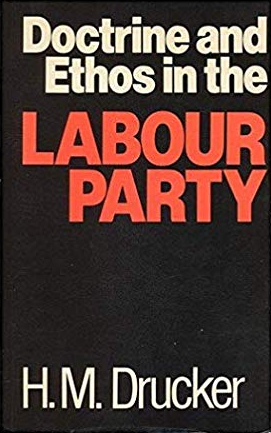Review of H.M. Drucker, Doctrine and Ethos in the Labour Party, Allen and Unwin, London 1979, published in Young Labor Journal, Vol. 2, 1980-81, Sydney, pp. 11-12.

Studies of the workings of the Labour Party usually concentrate on the workings of Labour Cabinets, the intellectual pretensions of its leaders and the ideological significance of Annual Conference decisions. For this reason most of the literature does not score the tunes to which the party is marching.
H.M. Drucker’s short study, Doctrine and Ethos in the Labour Party, is an exception to this trend. It is refreshing to read that the author declares his subject is the British Labour Party; he does not intend to write as if the British Labour Party is the Fabian Society or a propaganda machine whose output can be tested for coherency, ideological antecedents or socialist purity.
The Drucker thesis is that the Labour Party’s ideology – “the traditions, beliefs, characteristic procedures and feelings which help to animate the members of the party” – contains two aspects: doctrine and ethos.
Doctrines are sets of ideas about the character of social, economic and political reality. Political doctrines set out a programme of action, which is usually revised from time to time, such as before a General Election.
But there is another part to the party’s ideology – its ethos, the values which arise out of the experience of the British working class. Unlike the wealth of written material available for the study of the doctrinal aspects of Labour Party policy, there are few written sources for describing its ethos: “when describing the ethos of a group we are forced to make hypotheses on the basis of the footprints the group has left behind.”
Examples of the party’s ethos includes loyalty to the party leader, the formality of the party’s procedures, complex rule book, etc., and suspicion of office bearers, in parliament or the party bureaucracy. Drucker makes out a case: (i) that these values are typically working class, and (ii) most of the academic literature ignores this aspect of the Labour Party.
The Labour Party is described as part of a wider movement of loosely related institutions and individuals all working for vaguely defined common goals. Such a party requires an organisational glue – a structure and a tradition which holds it together.
Party conferences are characterised by speeches of rededication to the ideals of the Founders, even if the speakers have little clue as to what were those ideals. “To complain that the terms ‘working class’ and ‘class solidarity’ are vague or unscientific is simply besides the point. The organisational problem is to hang together.”
The rhetoric and symbols of the past are part of the organisational glue which keeps the party in one piece. Labour’s achievements are spontaneously recalled by party activists, and it is this sense of a proud past which largely impels them to perform their humdrum tasks. Drucker points out, “a past can be kept alive as long as it is believed. There is nothing about the movement of clocks which diminishes it.”
After describing the party’s ideology and the factors which inspire its members, Drucker examines the dilemmas facing a democratic socialist in the British Labour Party. He argues that the equality of opportunity notions of Anthony Crosland and social democrats are as muddled as the nationalisation arguments of the [UK] Tribune socialists. Drucker briefly sets out his views on ‘equality of regard’ as a philosophical basis of democratic socialism and attacks the ‘corporate socialism’ which existed in the last years of the Callaghan Labour government. Space prevents a detailed discussion of these issues, but anyone interested in the future direction of the labour movement would do well to read Drucker’s account.
He concludes that the Labour Ministers have a hard time in relating their ideas of achieving socialism through parliamentary means. Parliament is overloaded with legislation, the diversity of government responsibilities are enormous, for many kinds of expenditure there are only arbitrary methods of measuring success, there is a lack of adequate knowledge for making informed decisions in many fields; in short, “planning is incredible”.
Of Labour Ministers, Drucker says: “It is they who have to face both their unreconstructed constituency parties and the reality of power in a bourgeois world without the aid of a specifically socialist ethos and with a threadbare series of doctrines.”
In other words, Drucker’s pessimism concerning the Labour Party resembles Peter Gay’s outlook in his classic biography of Eduard Bernstein, The Dilemma of Democratic Socialism.
But unlike Gay, Drucker does not conclude that the implementation of democratic socialist ideals is doomed to failure.
Drucker’s book is a brilliant sketch of Labour politics and a polemic against the ‘corporate socialism’ of the modern British labour movement. His ideas concerning ‘equality of regard’, though not well-developed, may provide fertile soil for the development of social democracy.
Postscript (2015)
As some of my other writings on Australian Labor politics indicate, Drucker had a big influence on my thinking.
Whenever I am overseas I try to meet up with someone who, from left field or through force of intellect and personality, might get me to think. In 1987, on a trip to the UK, I went to Edinburgh to spend a weekend with Dr Henry Drucker (not to be confused with the US business academic Peter Drucker) and his wife Nancy (the social worker and childrens’ author) at their home. Years before, I read Henry’s short book Doctrine and Ethos in the Labour Party which, despite its heavy, almost thuddingly dull title, is the most interesting book on the culture of the Labour Party in the UK, which I chanced upon at a bookshop in Sydney. I decided to track him down, wrote to him and published an article by Drucker, ‘SDP Swings Hard Right. British Labour Revives’ in Labor Leader, September/October 1982.
I decided, with a Commonwealth and Foreign Office sponsored visit to the UK in 1987 coming up, to go to Edinburgh and meet him; it was a pleasant weekend, learning about his upbringing (Jewish from Philadelphia, interest in US Democratic politics, move to the UK to research & write a Ph.D. at the LSE, eventual immersion in Scottish politics with the Labour Party, including with a then budding Scottish politician and later Labour MP, Gordon Brown – they wrote a few books together.)
I told them that life in Australia was superb – a relatively egalitarian society, a Labor government (at the time), a broadly social democratic society (a ‘fair go for the underdog’ ethos), great surfing beaches, a vibrant culture – and you could eat mangoes all year long; I loved them for breakfast! This latter point, in wintry Edinburgh, struck the couple as my most telling point in favour of Oz.
One thing, though, he hated was travel; even the trip across the Atlantic left him jetlagged and disoriented for a week; he could not imagine flying to Australia; besides, his health would not be up to it, he feared.
But he also thought that if he did move, it would be permanent. I put him in touch with an academic at Sydney University, Dr Terry Irving, and they discussed the potential in correspondence and, I believe, at a meeting in London, should a Chair in Government crop up. But nothing came of that.
His book on the Labour Party, its rituals and traditions, its culture, was written from the perspective of a ‘outsider insider’ – a person who from another culture and political tradition (in the States) found the Labour Party strange, another country, though he eventually as a party member and activist assimilated the culture; I remember his saying to me that most books on the party were written as if the party was the Fabian society, rather than as a social organisation; to understand the party one needed to know both its ideas and ideology as well as its ethos. In reading the literature to discover the latter was like, from the footprints, constructing or imagining the beast above; he wanted to write something enfused with his experiences as well as wide reading.
When I last met him more in 2002 or so, he had long moved on – to philanthropy – and was the first major (and very successful) fundraiser for Oxford University; in the early nineties I received some publications in his capacity as head of the ‘Campaign for Oxford’. Some of his research and interests were moving to innovative areas. I remember having lunch with him at the Reform Club on Pall Mall (in London) wherein he discussed Cardiff City’s interest in getting “on the map”, by getting something commissioned akin to Sydney’s opera house. How did we do it? He was considering taking on the job.
In 2006, on a return trip to the UK, I decided to look him up, make contact and renew a friendship; I would be in London long enough; what had happened to the Cardiff venture? What did he think of UK Labour now, after eight years in government? Then I learnt the news. He had died almost two years ago. Life is indeed brief – like a drop of water on a blade of grass. One quote from Hamlet that I cling to is this: “Those friends thou hast, and their adoption tried, Grapple them unto thy soul with hoops of steel.” In my memory of our friendship, that line came to mind.







